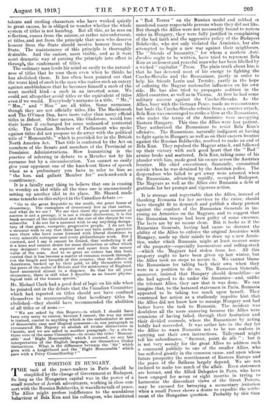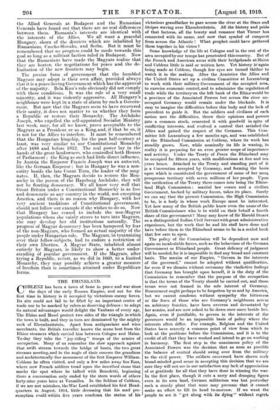THE POSITION IN HUNGARY. T HE task of the peace-makers in
Paris should be simplified by the change of Government at Budapest. So long as the Hungarian capital was in the power of a small number of Jewish adventurers, working in close con- cert with the Russian Bolsheviks, it was idle to talk of peace. The Allies might profess indifference to the scandalous behaviour of Bela Kun and his colleagues, who instituted a " Red Terror " on the Russian model and robbed of murdered many respectable persona whom they did not like.
But though the Allies were not necessarily bound to restore order in Hungary, they were fully justified in complaining of the bad faith and the aggressive policy of the Budapest Bolsheviks, who not only violated the Armistice, but also attempted to begin a new war against their neighbours. The " friends of humanity," for whom a modern Anti- Jacobin ought to be written, have tried to represent Bela Run as an honest and peaceful man who has been libelled by a wicked " capitalist " Press. The plain truth about him is that he has devoted most of his energy to fighting the Czecho-Slovaks and the Rumanians, partly in order to help his friends Lenin and Trotsky, partly in the hope of enlisting the Magyar nationalist influences on his own side. He has also tried to propagate sedition in the Allied countries, as well as in Vienna. At first he had some military success against the Czecho-Slovaks. As the Allies, busy with the German Peace, made no remonstrance but bade the Czecho-Slovaks refrain from a counter-attack, Bela Run was encouraged to strike a blow at the Rumanians, who under the terms of the Armistice were occupying Eastern Hungary. This time the Allies were less patient. They authorized the Rumanians to resist Bela Run's offensive. The Rumanians, naturally indignant at having to fight again in Hungary as well as on their eastern frontier against the Russian Bolsheviks, resolved to make an end of Bela Kun. They repulsed the Magyar attack, and followed up their victory with such good heart that the " Red " armies broke and scattered. Bela Bun, taking some of his plunder with him, made good his escape across the Austrian frontier. His chief executioner, Szamuely, committed suicide when he was detained by the Austrian police. The desperadoes who failed to get away were arrested when the Rumanians, advancing rapidly, occupied Budapest. The Magyars as well as the Allies owe Rumania a debt of gratitude for her prompt and vigorous action.
It is strange and regrettable that the Allies, instead of thanking Rumania for her services to the cause, should have thought fit to despatch and publish a sharp protest against the conduct of the Rumanian Generals in im- posing an Armistice on the Magyars, and to suggest that the Rumanian troops had been guilty of some excesses. The facts are by no means clear. But it looks as if the Rumanian Generals, having had cause to distrust the ability of the Allies to enforce the original Armistice with Hungary, made up their minds to draw up a new Armis- tice, under which Rumania might at least recover some of the property—especially locomotives and rolling-stock —which the Magyars had stolen from her. All this property ought to have been given up last winter, but the Allies took no steps to secure it. We cannot blame the Rumanians for taking back their own when they were in a position to do so. The Rumanian Generals, moreover, insisted that Hungary should demobilize—as she had agreed to do under the Armistice—and, unlike the tolerant Allies, they saw that it was done. We can imagine that, to the harassed statesmen in Paris, Rumania appeared to be taking too much upon herself. They construed her action as a studiously impolite hint that the Allies did not know how to manage Hungary and had better leave the task to Rumania. The incident was doubtless all the more annoying because the Allies were conscious of having failed, through their hesitation and their divided counsels, where the Rumanians by acting boldly had succeeded. It was rather late in the day for the Allies to warn Rumania not to be too zealous in carrying out their own instructions. Talleyrand might tell his subordinates, " Surtout, point de zele " ; but it is not very seemly for the great Allies to address such a command publicly to one of the smaller Allies, who has suffered greatly in the common cause, and upon whose future prosperity the resettlement of Eastern Europe and the peace of the Balkans largely depend. We are not inclined to make too much of the affair. Even statesmen are human, and the Allied Delegates in Paris, who have been engaged for seven or eight months in trying to harmonize the discordant views of the Great Powers, may be excused for betraying a momentary irritation when a small Power shows a desire to expedite the settle- ment of the Hungarian question. Probably by this time the Allied Generals at Budapest and the Rumanian Generals have found out that there are no real differences between them. Rumania's interests are identical with the interests of the Allies. We all want a peaceful Hungary, shorn of the districts which are inhabited by Rumanians, Czecho-Slovaks, and Serbs. But it must be remembered that no progress could be made towards this goal so long as a militant faction ruled in Budapest. Now that the Rumanians have made the Magyars realize that they are beaten, the negotiations for peace and the de- limitation of the new frontiers may begin.
The precise form of government that the humbled Magyars may adopt is their own affair, provided always that it is a peace-loving Government which has the approval- of the majority. Bela Kun's rule obviously did not comply with these conditions. It was the rule of a very small minority, and it was violently aggressive. All Hungary's neighbours were kept in a state of alarm by such a Govern- ment. But now that the Magyars seem to have recovered their sanity, it does not matter to us whether they form a Republic or restore their Monarchy. The Archduke Joseph, who expelled the self-appointed Socialist Ministry last week, may, for all we know, prove acceptable to the Magyars as a President or as a King, and, if that be so, it is not for the Allies to interfere. It must be remembered that the Hungarian kingship, for the past half-century at least, was very similar to our Constitutional Monarchy after 1688 and before 1832. The real power lay in the hands of the great landowners, who controlled both Houses of Parliament ; the King as such had little direct influence. In Austria the Emperor Francis Joseph was an autocrat, like the German Emperor ; but in Hungary he was a non- entity beside the late Count Tisza, the leader of the mag- nates. If, then, the Magyars decide to restore the Mon- archy in the person of the Hapsburg Archduke, they will not be flouting democracy. We all know very well that Great Britain under a Constitutional Monarchy is as free and democratic as any country in the world, not excepting America, and there is no reason why Hungary, with her very ancient traditions of Constitutional government, should not follow our example if she wishes to do so. Now that Hungary has ceased to include the non-Magyar populations whom she vainly strove to turn into Magyars, she may develop her old institutions naturally. The progress of Magyar democracy has been hampered by fear of the non-Magyars, who formed an actual majority of the people under Hungarian rule. The Magyars,in tyrannizing over their fellow-subjects, had to endure a restriction of their own liberties. A Magyar State, inhabited almost entirely by Magyars, is likely to show a better under- standing of popular government. If the Magyars, after trying a Republic, revert, as we did in 1660, to a limited Monarchy, they may possibly achieve a greater measure of freedom than is sometimes attained under Republican forms.



































 Previous page
Previous page